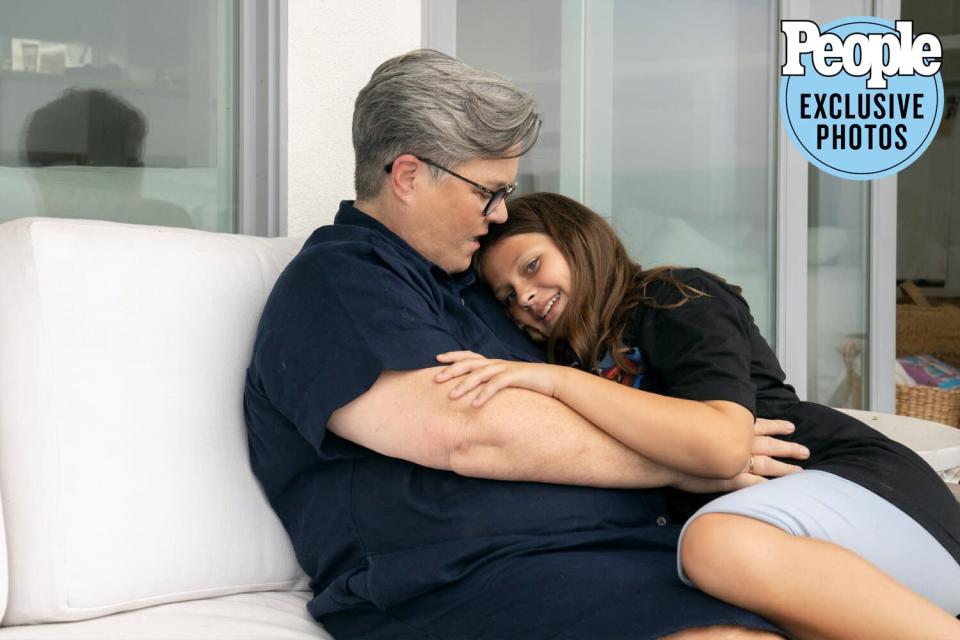
Chloe Aftel
When her daughter Dakota was diagnosed with autism at age 2½ in 2016, Rosie O’Donnell felt afraid at first. “I was worried about how she would make it in this world,” says the star, now 60. “I worried about my longevity, because as you speak to parents of kids with autism, their main worry is what happens when they die. Who’s going to love their child and understand them the way you do?”
It’s something that O’Donnell, now playing a tough-talking detective in the Showtime series American Gigolo, still grapples with as she watches her 9-year-old daughter come of age in a world that does not always understand her complexities. “I know this is something that will be with her her whole life, and she’ll learn to adjust to a world that doesn’t necessarily go at her own pace,” says O’Donnell, also mom to Parker, 27, Chelsea, 25, Blake, 22, and Vivienne, 19.
Meanwhile, raising her active, artistic little girl has given O’Donnell new perspective. “With Dakota, I am learning to have compassion much deeper than I ever did,” she says. “To really listen and communicate in a way I never had to with my other kids. I know there are people struggling and they don’t know how they will get through another day. And I understand. But the sense of vulnerability that comes with having a kid with autism has been a gift to me. She teaches me.”
Here O’Donnell shares their journey in her own words.
Never miss a story — sign up for PEOPLE’s free daily newsletter to stay up-to-date on the best of what PEOPLE has to offer, from juicy celebrity news to compelling human interest stories.


courtesy of Rosie O’Donnell
RELATED: Rosie O’Donnell Explains Emotional Reason Picking Up Daughter, 8, from School Is Important to Her
Dakota’s first word was a full sentence before she was 1. We were watching Frozen, and she said “I been…pale.” I said, “What?” and then I hear Olaf say “I’ve been impaled.” She was always highly verbal. Sometimes she would stare off in a way that she felt unreachable for a moment. She had a little bit of stimming [a repetitive behavior often associated with autism] she was doing with her hands. She has always been very cuddly — and loves to curl up beside me on the couch. I thought she was quirky — and beautiful and perfect.
Still, I knew something was off, but I wasn’t sure what it was. She did not answer to her name. When she was being tested [for autism], the doctor kept calling out to her “Dakota, Dakota.” She didn’t respond. Somewhere deep down I knew. Getting the diagnosis felt like I was punched in the stomach. I had to give myself a moment to go, “Okay, we’re going to figure out how to get through it.”
You can read as much as possible, but they say when you meet one person with autism, you’ve met one person with autism. It’s a spectrum. For me — it’s like an angel fell into my life. One who doesn’t function by societal standards. I’m not taking away from the pain and hardship that this diagnosis brings to families. All of a sudden, there’s a child with a lot of needs and you spend a lot of time trying to connect on their level. It’s not easy — but it’s necessary to let them know they are seen.
I didn’t want Dakota to feel shame about her diagnosis. I have told her from the start that autism is her superpower. I hear her announcing to strangers, “My name is Dakota. I’m 9 and I have allergies and autism.” It’s like a different operating system.
She was endlessly curious. So I focused on how to enable her to learn in the way that her brain was set up to learn. When she was in second grade, all the kids were reading Dory Fantasmagory. Even though she couldn’t read, she would bring the book to school and pretend. I knew for her self-esteem, we had to get her reading. We found a great school in Los Angeles, and she’s now reading at grade level. They have all kinds of neurodivergent kids and special-needs learners. It’s a beautiful melting pot.
She feels things deeply but doesn’t always express emotions. We were driving home one night and she said, “Mommy, there’s water on my face.” I said, “Those are tears. Are you sad?” and we talked about what feelings were. I held her and let her cry, reminding her everyone has feelings.
Sometimes she’s a little awkward with strangers and she’ll start to give them scientific information. She tells kids about the Mariana Trench and how to dig up sea crabs. We were once playing on the beach with a new family. I said to the dad under my breath, “She’s neurodivergent.” Then Dakota turned and said, “I have autism. It’s okay.”


courtesy of Rosie O’Donnell
When she was 5 she asked if she could talk to her birth mother. We’re in contact, so Dakota gets on FaceTime and says, “Are you the lady whose tummy I was in? I just wanted you to know I’m the kid that was in there, and when I got born, my mommy held me and I squeezed her pinkie, and I am with her. So I just want to let you know that’s what happened to me. Bye.” I was in tears as was her birth mom. That’s a pretty intense, complex, emotional thing for a little girl to put together.
Dakota is 9½ now. I’ve been fraught with anxiety when each of my children turned 10. I have that year of thinking, “I better not die.” I was 10 years old when my mom died of breast cancer. It’s a shocking thing to lose a mother at a young age. Your mom is the center. You need them for everything: training bras, transitioning into puberty. Going through that on my own was a scary part of my childhood. You feel very alone. I don’t ever want Dakota to feel that.
Dakota’s autism forces me to see the world from a completely different place. She’s a gift from another dimension. The things she knows — about sea anemones and tide pools. I got to 60 not knowing about the Mariana Trench. Now I know all about it! Her ability to absorb information is unparalleled. I can imagine her winning on Jeopardy! someday. She teaches me. To be able to see the world as she does — for me, it’s been a wonderfully magical experience. I’m so glad we have each other.
For more on Rosie O’Donnell, pick up the latest issue of PEOPLE, on newsstands Friday, or subscribe here.




